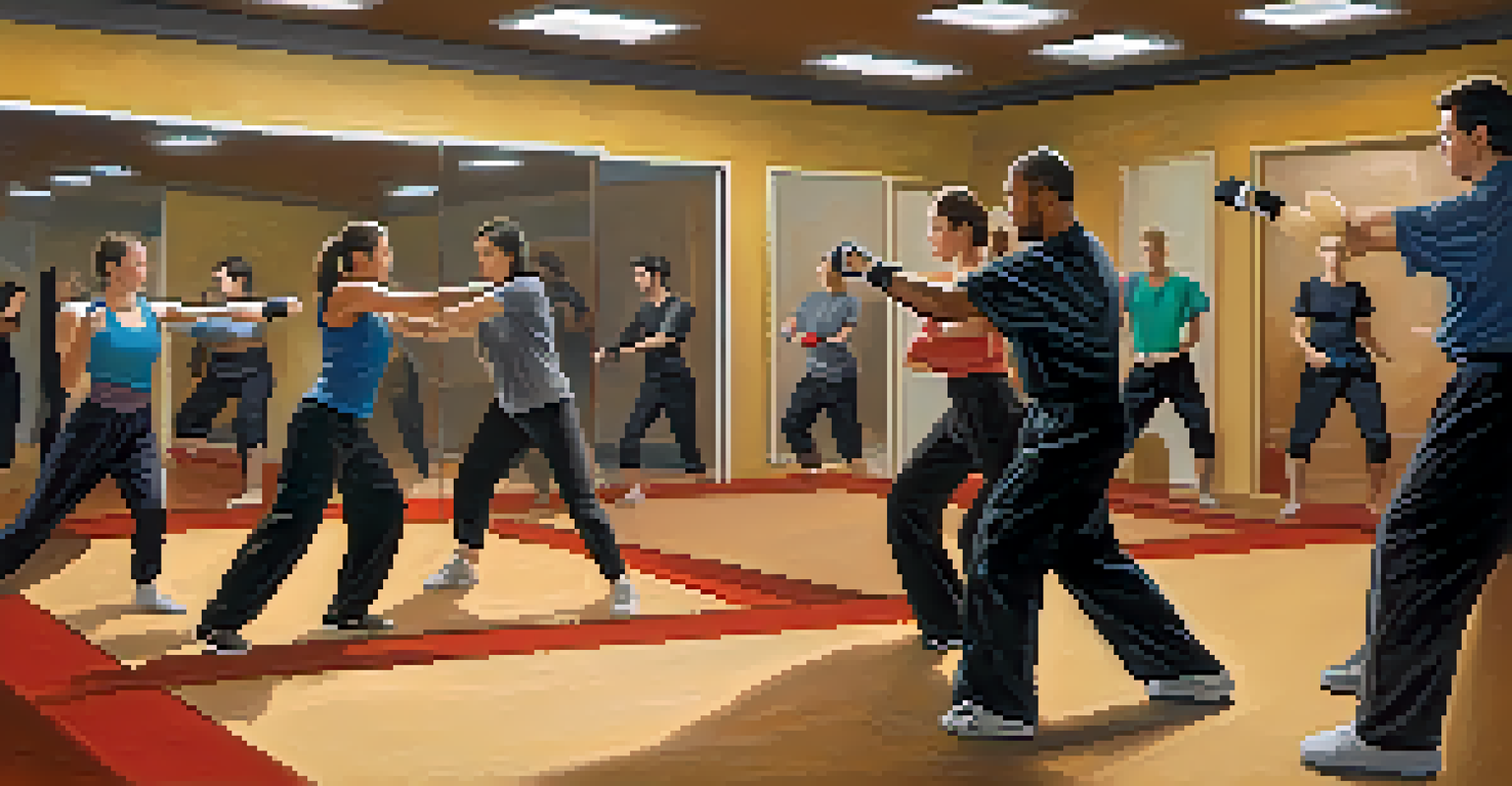How to Develop a Self Defense Mindset for Everyday Life

Understanding the Importance of a Self Defense Mindset
Having a self defense mindset is about more than just physical training; it's a mental approach to safety. This mindset helps you stay alert and aware of your surroundings, allowing you to spot potential threats before they become real dangers. It’s like having an internal radar that keeps you tuned into what's happening around you, which can often prevent dangerous situations from arising.
The best defense is a good offense.
Imagine walking through a park and noticing a group that seems suspicious. Instead of dismissing your gut feelings, a self defense mindset empowers you to take action—whether that’s crossing the street or finding a safer route. This heightened awareness is crucial because many self defense situations can be avoided simply by being more observant.
Ultimately, cultivating this mindset helps you feel more in control of your environment. It’s not about living in constant fear; rather, it’s about being prepared and empowered to handle whatever comes your way.
Developing Situational Awareness in Daily Life
Situational awareness is the ability to perceive and understand what’s happening around you. It’s akin to being the main character in your own action movie, always aware of the plot twists that might occur. To develop this skill, practice being present in the moment and observing the details of your surroundings, from the people nearby to the layout of the space.

Start small: when you enter a coffee shop, take note of the exits, the layout, and the people around you. This habit will enhance your ability to notice changes in your environment, making you more prepared for any unexpected situations. Think of it as training your brain to be a detective—always looking for clues that could indicate potential danger.
Self Defense Mindset is Essential
Developing a self defense mindset enhances your awareness and empowers you to handle potential threats effectively.
With practice, situational awareness becomes second nature, and you'll find yourself more confident in navigating various environments. This is a key component of a self defense mindset, allowing you to respond effectively when needed.
Trusting Your Instincts: The Power of Gut Feelings
Your instincts are powerful tools that can help protect you. Often, we dismiss our gut feelings as mere anxiety or paranoia, but these instincts are your brain's way of processing information quickly. When something feels off, it’s worth paying attention to, as your subconscious may have picked up on cues that your conscious mind hasn’t yet recognized.
Instinct is a marvelous thing. It can neither be explained nor ignored.
For instance, if you feel uneasy walking down a quiet street, trust that feeling. It’s not always about being in a high-risk situation; sometimes, it's just knowing when something doesn't feel right. A self defense mindset encourages you to listen to these signals, as they could be your best defense against potential threats.
By trusting your instincts, you cultivate a stronger sense of self-preservation. This not only helps in avoiding dangerous situations but also bolsters your confidence in making decisions that prioritize your safety.
Practicing Basic Self Defense Techniques
While a self defense mindset is primarily mental, knowing some basic self defense techniques can be incredibly empowering. Consider taking a self defense class, where you can learn practical skills that are easy to remember and apply. These classes often teach simple moves that can help you escape if ever confronted with a physical threat.
For example, learning how to break free from a wrist grab or how to use your voice effectively can make a significant difference in a tense situation. It’s much like learning to ride a bike; once you know how, you feel more confident navigating various terrains. Similarly, self defense skills can provide you with the tools needed to respond when it matters most.
Trust Your Instincts for Safety
Listening to your gut feelings can help you identify and avoid dangerous situations before they escalate.
Moreover, practicing these techniques reinforces the self defense mindset. The more familiar you become with your capabilities, the more prepared you will feel in everyday life, which can help reduce anxiety and increase your overall confidence.
Building Confidence Through Regular Training
Confidence is a crucial aspect of a self defense mindset, and one of the best ways to build that confidence is through regular training. Whether it’s martial arts, yoga, or simply physical fitness, engaging in activities that challenge your body can enhance your self-esteem and resilience. Think of it as strengthening your mental muscle—just as important as the physical side.
When you engage in regular training, you develop not just physical skills but also a sense of accomplishment. Each small victory, whether it’s mastering a new technique or simply showing up to class, contributes to a more confident you. This newfound confidence can translate into everyday situations, making you less likely to be seen as a target by potential threats.
Ultimately, cultivating confidence through consistent practice helps solidify your self defense mindset. You’ll feel empowered to face challenges head-on, whether they are physical confrontations or simply navigating the complexities of daily life.
Using Verbal Skills to Defuse Potential Conflicts
In many instances, a potential conflict can be diffused with the right words. This is where verbal self defense comes into play. It’s about using your voice and communication skills to assert yourself, establish boundaries, and deescalate situations before they escalate into violence.
Consider how you might respond if someone approaches you aggressively. Using a calm, firm tone while maintaining eye contact can often deter further aggression. Think of your voice as a shield; it can protect you without needing to resort to physical measures, making it a valuable tool in your self defense arsenal.
Regular Training Boosts Confidence
Consistent practice of self defense techniques and physical training builds confidence, making you feel more in control.
By practicing these verbal techniques, you not only protect yourself but also develop a greater sense of control over your interactions. This aspect of a self defense mindset emphasizes the importance of communication, which can be just as effective as physical techniques in keeping you safe.
Creating a Safety Plan for Various Scenarios
Having a safety plan is a proactive way to reinforce your self defense mindset. This plan can include strategies for various scenarios, whether you're at home, out in public, or traveling. Think of it like a fire drill—you prepare in advance so that you know what to do when the unexpected happens.
Start by identifying potential threats in your environment and create action steps for each scenario. For example, if you're walking alone at night, plan your route in advance and share it with a friend. Having a clear plan can help reduce panic and allows for quick decision-making in stressful situations.

By being prepared, you cultivate a sense of empowerment and control over your safety. This not only helps you feel more secure but also reinforces the self defense mindset that you can take charge of your own well-being.